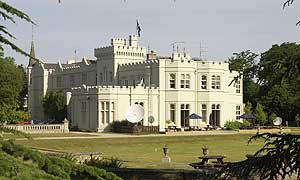The British Broadcasting Corporation is a member of CALLAS.
The British Broadcasting Corporation is the largest broadcasting corporation in the world in terms of audience numbers, e mploying over 20,000 staff.
mploying over 20,000 staff.
Founded in 1922 as the British Broadcasting Company Ltd, it was subsequently granted a Royal Charter and made a state-owned but independent corporation in 1927.
The corporation produces programmes and information services, broadcasting globally on television, radio, and the Internet. The stated mission of the BBC is "to inform, educate and entertain"; its motto is "Nation Shall Speak Peace Unto Nation".
 The Research and Innovation department (BBC R&I) is the BBC’s technology research facility, covering all aspects of technology that are central to the BBC’s future technology strategy.
The Research and Innovation department (BBC R&I) is the BBC’s technology research facility, covering all aspects of technology that are central to the BBC’s future technology strategy.
BBC R&I has an excellent track record in the application of 3D interactive technology for broadcast.
This began with its participation in the RACE project MONA LISA, which demonstrated the first live virtual studio and vision-based camera tracking system at IBC’94. A few years later, work turned to look at production, delivery, and display of 3D TV content using commodity computer technology, with the UK government funded PROMETHEUS project.
From this, a live end-to-end 3D content production system was demonstrated at IBC'02. The main outcome of the project was the understanding that research and development in this field should be focused towards new interactive home platforms: how does the broadcaster get content onto them and what form would that content take? This led BBC R&I to the development of the open source '3D Interactive Media Lounge’ research software, which explored the notion of mixing streamed linear and 3D interactive content. It was primarily used as a means for engaging BBC producers in discussions on content. The demo was shown at SIGGRAPH 2005 and led to the BBC’s broadcast of a special ‘Radio1 roadshow’ into ‘SecondLife’ in 2006.
Effort is now focused on research in support of authoring meaningful content – i.e. ‘interactive story-telling’.
BBC R&I joined the CALLAS consortium because they are interested in exploring how the affective state of the user changes through the course of a story, and how this can be utilised to move away from overtly deterministic forms of interactive story-telling. Thus yielding a future form of interactive platform and content that is highly engaging and richly participative, yet wholly unlike the interactive TV that we know today.
Contact: Marc Price
Website: www.bbc.co.uk/rd/
The British Broadcasting Corporation is the largest broadcasting corporation in the world in terms of audience numbers, e
 mploying over 20,000 staff.
mploying over 20,000 staff. Founded in 1922 as the British Broadcasting Company Ltd, it was subsequently granted a Royal Charter and made a state-owned but independent corporation in 1927.
The corporation produces programmes and information services, broadcasting globally on television, radio, and the Internet. The stated mission of the BBC is "to inform, educate and entertain"; its motto is "Nation Shall Speak Peace Unto Nation".
 The Research and Innovation department (BBC R&I) is the BBC’s technology research facility, covering all aspects of technology that are central to the BBC’s future technology strategy.
The Research and Innovation department (BBC R&I) is the BBC’s technology research facility, covering all aspects of technology that are central to the BBC’s future technology strategy. BBC R&I has an excellent track record in the application of 3D interactive technology for broadcast.
This began with its participation in the RACE project MONA LISA, which demonstrated the first live virtual studio and vision-based camera tracking system at IBC’94. A few years later, work turned to look at production, delivery, and display of 3D TV content using commodity computer technology, with the UK government funded PROMETHEUS project.
From this, a live end-to-end 3D content production system was demonstrated at IBC'02. The main outcome of the project was the understanding that research and development in this field should be focused towards new interactive home platforms: how does the broadcaster get content onto them and what form would that content take? This led BBC R&I to the development of the open source '3D Interactive Media Lounge’ research software, which explored the notion of mixing streamed linear and 3D interactive content. It was primarily used as a means for engaging BBC producers in discussions on content. The demo was shown at SIGGRAPH 2005 and led to the BBC’s broadcast of a special ‘Radio1 roadshow’ into ‘SecondLife’ in 2006.
Effort is now focused on research in support of authoring meaningful content – i.e. ‘interactive story-telling’.
BBC R&I joined the CALLAS consortium because they are interested in exploring how the affective state of the user changes through the course of a story, and how this can be utilised to move away from overtly deterministic forms of interactive story-telling. Thus yielding a future form of interactive platform and content that is highly engaging and richly participative, yet wholly unlike the interactive TV that we know today.
Contact: Marc Price
Website: www.bbc.co.uk/rd/
